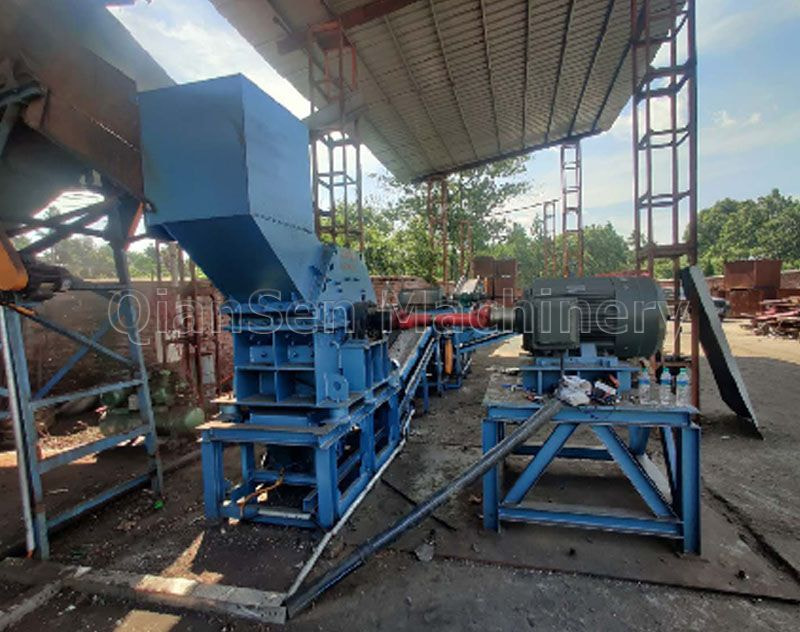FAQs | Everything You Need to Know About Can Crushers
Can crushers are essential tools for reducing the volume of aluminum cans, making recycling more efficient and environmentally friendly. Whether you're using a can crusher at home or in an industrial setting, understanding the functionality, safety features, and best practices is crucial. Here are some frequently asked questions about can crushers, answered in detail:

What is a Can Crusher?
A can crusher is a device used to reduce the size of aluminum cans, making them easier to store and recycle. By compressing cans, these devices save space in recycling bins and reduce the frequency of waste collection.
How Does a Can Crusher Work?
Can crushers typically use mechanical leverage to crush cans. When you pull the lever or press the button, the crusher compresses the can against a sturdy base, reducing its volume significantly. Some can crushers are manual, while others are powered by electricity or air pressure.
Types of Can Crushers
There are several types of can crushers available:
Manual Can Crushers: Operated by hand, these crushers are simple, affordable, and require no power source.
Electric Can Crushers: These devices use an electric motor to crush cans, making the process faster and easier.
Pneumatic Can Crushers: Powered by air pressure, these crushers are highly efficient and suitable for heavy-duty use.
Safety Features in Can Crushers
Safety is a paramount concern when using can crushers. Many models come with built-in safety features to prevent accidents and injuries:
Safety Interlock on Access Door: Ensures the crusher cannot operate unless the door is securely closed, preventing accidental operation.
Blow Tube Safety Restraints: Prevents the blow tube from becoming dislodged during use, which could cause malfunction or debris projection.
Enclosed Chain and Belt Guards: Protect users from moving parts, such as chains or belts, reducing the risk of injury.
What Safety Precautions Should I Take?
When using a can crusher, follow these safety precautions:
Wear Protective Gear: Use gloves and safety glasses to protect your hands and eyes from potential debris.
Follow Instructions: Read and follow the manufacturer's instructions for safe operation.
Inspect Equipment Regularly: Check for any signs of wear or damage before use to ensure the device is in good working condition.
Keep the Area Clear: Ensure the area around the can crusher is free of obstructions and hazards.
Benefits of Using a Can Crusher
Using a can crusher offers several advantages:
Further reading:How to Buy Battery Pack Assembly Line Efficiently
Maximize Your Production: VSI Sand Maker for Optimal Particles
Sand Making Equipment vs. Traditional Methods: Recycled Sand Processing
Optimize Your Complete-Baguette-Line in 2024
What is Hydraulic Cone Crusher for Fine Crushing?
Maximize Efficiency: Hydraulic Cone Crusher for Quartzite Processing 2024
Maximize Seafood Freshness: Plate Heat Exchangers Explained
Space Saving: Compressing cans reduces their volume, saving space in recycling bins and storage areas.
Environmental Impact: By making recycling more efficient, can crushers contribute to environmental conservation.
Cost Efficiency: Reducing the volume of waste can lower waste management costs and reduce the frequency of waste collection.
How to Choose the Right Can Crusher
Consider the following factors when choosing a can crusher:
Type of Use: Determine whether you need a manual, electric, or pneumatic crusher based on the volume of cans you need to crush.
Size and Capacity: Ensure the crusher can handle the size and number of cans you typically use.
Safety Features: Look for models with essential safety features to protect users.
Durability: Choose a crusher made from robust materials to ensure longevity and reliable performance.
Maintenance Tips for Can Crushers
Proper maintenance ensures your can crusher remains in good working condition:
Regular Cleaning: Clean the crusher regularly to remove any debris or residue.
Lubrication: Lubricate moving parts as recommended by the manufacturer to ensure smooth operation.
Inspection: Regularly inspect the crusher for any signs of wear or damage and replace any worn parts promptly.
Storage: Store the can crusher in a dry, secure location when not in use to prevent rust and damage.
Common Questions About Can Crushers
Q: Can I use a can crusher for other materials?A: Can crushers are designed specifically for aluminum cans. Using them for other materials can damage the device and pose safety risks.
Q: How much force is needed to crush a can?A: The amount of force needed varies by crusher type, but most manual can crushers can generate enough force to crush a standard aluminum can with minimal effort.
Q: Are can crushers easy to install?A: Yes, most can crushers are easy to install and come with detailed instructions. Some models can be mounted on walls or workbenches for added convenience.
In conclusion, can crushers are valuable tools for anyone looking to reduce waste and promote recycling. By understanding their functionality, safety features, and maintenance requirements, you can choose the right can crusher for your needs and ensure safe, efficient operation.
Maximize Efficiency: Top Tips for Using Cone Crushers
Benefits of High Efficiency Boilers for Industrial Use
What is a Baguette Production Line?
How Can Hot Air Welding Enhance Environmental Remediation Efficiency?
Top Rated Good Comments on Brazed Plate Heat Exchangers
Small Scale Distillation Equipment: DIY vs. Commercial Solutions
Are Your Burger Moulders Delivering Consistent Quality and Efficiency?
Previous
None
Next
None
Related Articles
If you are interested in sending in a Guest Blogger Submission,welcome to write for us!









Comments
0